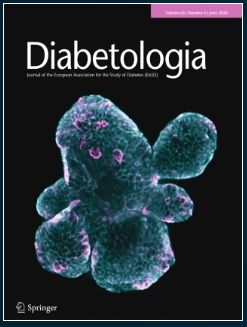β细胞在2型糖尿病中的作用:过去5年的新发现。
IF 10.2
1区 医学
Q1 ENDOCRINOLOGY & METABOLISM
引用次数: 0
摘要
全基因组方法的最新进展,分离的人类胰岛的可用性以及在大型临床试验中对新型肠促胰岛素模拟物的评估,使我们对胰腺β细胞在2型糖尿病中的作用的理解取得了显着进展。在这里,我们回顾了2型糖尿病的发生、进展和缓解的关键进展,主要集中在过去5年发表的人类研究。多组学技术的进步使研究人员能够确定2型糖尿病风险变异与控制β细胞发育、功能和应激恢复能力的胰岛内分泌细胞基因调控网络之间的联系。这些研究支持了这样一种观点,即胰岛素分泌的早期异常,而不是β细胞质量的减少,在2型糖尿病的早期发病机制中起着根本和主要的作用。导致这些内在β细胞缺陷的是来自其他(内分泌和非内分泌)胰岛细胞、外分泌胰腺、肠道和胰岛素敏感组织的各种致病信号。很明显,β细胞是由异质群体组成的,它们对压力情况的反应不同,而且β细胞反应的性别相关差异不应被低估。最后,人体临床试验清楚地表明,糖尿病的缓解可以通过使用降糖疗法,特别是侧重于减肥的策略来实现,包括减肥手术,以及最近使用的针对肠促胰岛素系统的高效新药。虽然过去5年取得了重大进展,但要将这些进展应用于临床,从而减轻数亿2型糖尿病患者的严重后果,还有很多工作要做。本文章由计算机程序翻译,如有差异,请以英文原文为准。
The role of the beta cell in type 2 diabetes: new findings from the last 5 years.
Recent advances in genome-wide approaches, the availability of isolated human islets for research and the evaluation of novel incretin mimetics in large clinical trials have brought about remarkable progress in our understanding of the role of the pancreatic beta cell in type 2 diabetes. Here, we review key developments in type 2 diabetes initiation, progression and remission, focusing mostly on human studies published in the last 5 years. Progress in multi-omics technologies has enabled researchers to identify links between type 2 diabetes risk variants and gene regulatory networks in islet endocrine cells that control beta cell development, function and stress resilience. These studies support the notion that early abnormalities in insulin secretion, rather than a reduction in beta cell mass, play a fundamental and primary role in early type 2 diabetes pathogenesis. Contributing to these intrinsic beta cell defects are various pathogenic signals from other (endocrine and non-endocrine) islet cells, the exocrine pancreas, the gut and insulin-sensitive tissues. It has also become apparent that beta cells comprise a heterogeneous population that responds differently to stress situations and that sex-related differences in beta cell responses should not be underestimated. Finally, human clinical trials have clearly demonstrated that diabetes remission can be achieved using glucose-lowering therapies and particularly strategies focused on weight loss, including bariatric surgery and, more recently, the use of highly efficient new drugs targeting the incretin system. While progress in the last 5 years has been significant, much remains to be uncovered to bring these advances to the clinic and thereby alleviate the dramatic consequences of type 2 diabetes complications for the hundreds of millions of people who live with this disease.
求助全文
通过发布文献求助,成功后即可免费获取论文全文。
去求助
来源期刊

Diabetologia
医学-内分泌学与代谢
CiteScore
18.10
自引率
2.40%
发文量
193
审稿时长
1 months
期刊介绍:
Diabetologia, the authoritative journal dedicated to diabetes research, holds high visibility through society membership, libraries, and social media. As the official journal of the European Association for the Study of Diabetes, it is ranked in the top quartile of the 2019 JCR Impact Factors in the Endocrinology & Metabolism category. The journal boasts dedicated and expert editorial teams committed to supporting authors throughout the peer review process.
 求助内容:
求助内容: 应助结果提醒方式:
应助结果提醒方式:


